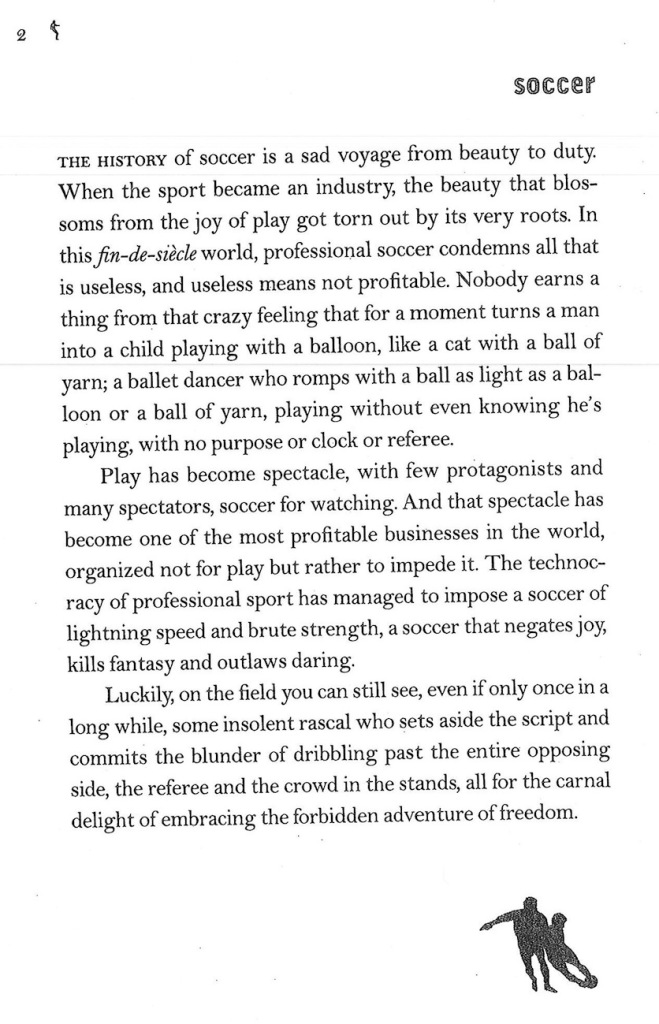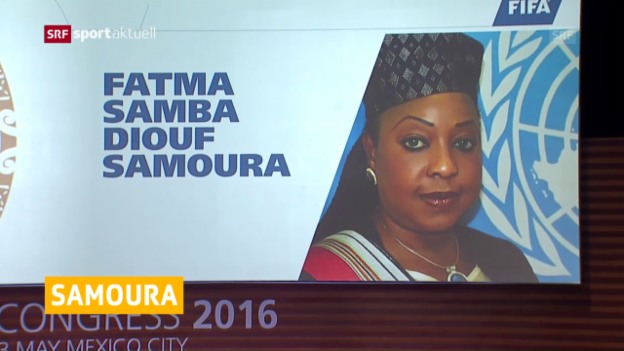
Fatma Samba Diop Samoura of Senegal, a career United Nations diplomat, was recently appointed by FIFA President Gianni Infantino as the world body’s new secretary general. “She will bring a fresh wind to FIFA—someone from outside,” Infantino declared.
Listen to my radio interview with Assumpta Oturu as we discuss the significance of Samoura’s appointment and its possible implications for substantive reforms at scandal-ridden FIFA.
The interview originally aired on KPFK’s “Spotlight Africa” program on June 3, 2016.
Category: Players
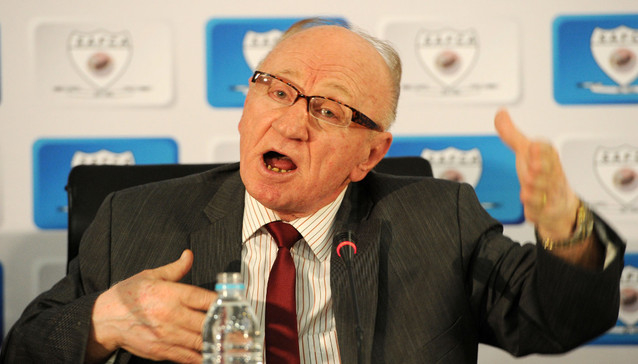
Ted Dumitru, the Romanian-born coach who had a successful career in South Africa, collapsed and died of an apparent heart attack on Thursday at Eastgate Shopping Centre in Johannesburg.
“Throughout our conversations over the years,” recalls Zola Doda in a touching tribute published on Kick Off magazine’s website, “Ted didn’t talk a lot about his country of birth, Romania, which came across as strange to me in the beginning. All he spoke about was South Africa and the African continent as a whole—but over a period time I learned to understand how much he really loved this country and this continent.”
Having coached briefly in the U.S., where he acquired citizenship, Dumitru took the helm of Zambia’s national team in 1981 and later that of Swaziland. He arrived in apartheid South Africa to coach Kaizer Chiefs in 1986, a time of mass protests and army troops deployed in the black townships. Dumitru went on to win four league titles, with Sundowns (1997-98 and 1998-99) and Chiefs (2003-04 and 2004-05), and also had a brief stint as national team coach.
Beyond his clubs’ successes, Dumitru had a major impact on South African coaching education and on youth development. I saw this personally and tracked it over two decades in South Africa and from overseas.
I first met Ted Dumitru in 1995. A friend I had met on the soccer pitch at Wits University took me to the South African Football Association’s first coaching certification course held at the School of Excellence. I was introduced to Dumitru, then the Director of Coaching at SAFA, who was dressed in his typical sweatsuit-and-baseball cap attire. As soon as he learned of my work on the history of football in South Africa, he asked me to return the following morning and give a formal presentation to the coaches. Dumitru believed a country needed to know its football history in order to develop its national identity.
The next day I faced an engaged audience that included Patrick Pule “Ace” Ntsoelengoe, Cedric “Sugar Ray” Xulu, Neil Tovey and many other legendary figures in the South African game. If that context wasn’t intimidating enough, I was also scheduled to follow the charismatic Clive Barker, then-national team coach who, a few months later, would lead Bafana Bafana to their first (and still only) African Nations Cup title.
Dumitru introduced me in a graciously professional and courteous way, which made me feel less intimidated by the moment and helped set the tone for what turned out to be a constructive session and dialogue among the participants.
During that visit, I learned of Dumitru’s background in Romania in the late 1960s and 1970s. I listened to him discuss the emergence of “scientific football” as popularized by Valeriy Lobanowski, the legendary coach of Dynamo Kiev and the USSR. At the time, it was a pioneering approach. It brought together empirical data, computer technology, Soviet collectivist ideology, and Dutch total football. It transformed the way Dumitru conceived, organized, and managed football teams. As Jonathan Wilson succinctly puts it, “football was less about individuals than about coalitions and the connections between them.”
To his credit, Dumitru’s experiences in southern Africa altered his football philosophy and practice to reflect local conditions. Dumitru passionately believed in the technical proficiency, dynamism, and creativity of local players. He spent much of the latter part of his career teaching both young boys and adult coaches how to draw on these strengths while combining them with aspects of scientific football. In the words of Mark Gleeson, Dumitru became “an outspoken proponent of the establishment of a so-called ‘ South African style of play’ with heavy emphasis on individual flair.”
This emphasis was clearly demonstrated before my eyes again in 2010—a magical year for South Africa as it successfully hosted the first World Cup played on African soil. Dumitru came to Pietermaritzburg to help train local coaches and in the process supervised a training session at the Izichwe Youth Football program, where I was involved. His principles were put into action, as he encouraged each and every player to think about space, quick decision-making, smart passing, confidence in dribbling, relationship with teammates, and to be unafraid of expressing joy on the pitch. When one boy scored a mesmerizing goal but did not celebrate, Dumitru encouraged him to do so: “Soccer is supposed to be fun!” he exclaimed.
Dumitru, of course, had his shortcomings. According to Gleeson, he was perceived by many as “dogmatic” and few can forget his public statement that South Africa’s first-round exit from the 2006 African Nations Cup was partly due to the fact that “my players don’t know how to play in the rain.”
Even so, Dumitru should be remembered as an innovative coach who left an important legacy in South Africa. He introduced new ideas from eastern Europe at a time when the country was isolated from international football and when South African coaching was dominated by English-speaking whites. Dumitru stands out as a rare white coach who genuinely believed in decolonizing South African football. To the end, he practiced what he preached. At the time of his passing, Dumitru was in town to give a speech at the South African Football Coaches’ Association Youth Coaching Seminar at Johannesburg Stadium.
Johan Cruyff, Football Genius, Dies at 68
Johan Cruyff, the Dutch football genius, has died of cancer at the age of 68.
When I was 7 or 8 years old, growing up in Rome, Italy, my older brother Danny took me along with some of his friends to watch “Il Profeta del Gol.” Sitting in the front row of a run-down movie theater with funky aromas, I was hypnotized by this mesmerizing documentary film about Cruyff. It was narrated by the legendary radio announcer Sandro Ciotti, whose raspy voice (along with the more suave one of Enrico Ameri) provided the soundtrack of our Sunday afternoons on “Tutto il calcio minuto per minuto”—the only live media coverage of Serie A available at the time. For years, I dreamed with eyes wide open of Cruyff’s “Impossible Goal” against Atletico Madrid.
Watching Cruyff took my typically Italian compulsive love for football to a precociously mature level. By the time Michel Platini (my hero) and Diego Maradona joined Juventus in ‘82 and Napoli in ‘84, respectively, I was ready for their magic. But when I had to move to the United States later in the 1980s, it was in deference to the Dutchman that I wore his number 14 on my high school, club, and college teams.
Cruyff seemed both extraordinary and ordinary. His visionary use of space, technical excellence, and quickness were inseparable from his scrawny physique, tempestuous nature, cigarette smoking, and dislike of fitness training.
Cruyff’s interpretation of football as a competitive art taught me to see alternative ways to play, move, think, and even “be.” Ajax’s “Total Football,” which Cruyff exported to Barcelona, first as a player then as a coach, was so radically different from the way Serie A teams played in the 1970s and early 1980s. “Everyone attacked and everyone defended,” Eduardo Galeano remembered, “deploying and retreating in a vertiginous fan.”
His stunning decision to boycott the Generals’ World Cup in Argentina in 1978, the first I followed religiously on television, endeared the Dutchman to me even more. An anti-fascist superstar who practiced what he preached! (The actual reason, I would later learn, had nothing to do with politics: he feared being kidnapped.)
Frits Barend, the Dutch TV commentator and personality, whom I met in South Africa in 1998, referred to Cruyff as an “obstinate maestro.” David Winner, author of Brilliant Orange, arguably the best book written in English about Dutch football and society, described him as “essentially Dutch.”
A poem by Toon Hermans, Winner writes, “captures the feeling that there was something sublime about Cruyff”:
En Vincent zag het koren
En Einstein het getal
En Zeppelin de Zeppelin
En Johan zag de bal
(And Vincent saw the corn
And Einstein the number
And Zeppelin the Zeppelin
And Johan saw the ball)
“To have a football was to have arrived”
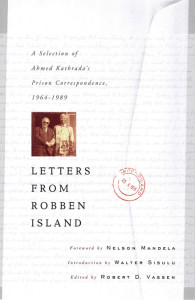 Bob Vassen’s passing fills me with immense sadness.
Bob Vassen’s passing fills me with immense sadness.
A great friend to those of us who had the privilege of knowing him. A courageous South African who fought for the freedom of his country, at home and in exile as a member of Umkhonto weSizwe (The Spear of the Nation). A committed teacher who mentored thousands of students, young and not so young, internationally. An intellectual who was as incisive as he was humble. Consider his masterful editorial work in Ahmed Kathrada’s Letters from Robben Island, published by Michigan State University Press.
And Bobby, as his friends called him, was also a football man. Like his father before him, he had played for one of Johannesburg’s oldest teams: Moonlighters FC, founded by Indian service workers in 1892. Growing up in Fordsburg and Doornfontein, gritty working-class neighborhoods in Johannesburg, “to have a football was to have arrived,” he recalled.
A few years ago, I had the honor of interviewing him about his football life. You can watch the full interview here.
Our heartfelt condolences go out to Ursula and the entire Vassen family. We miss you Uncle Bobby.
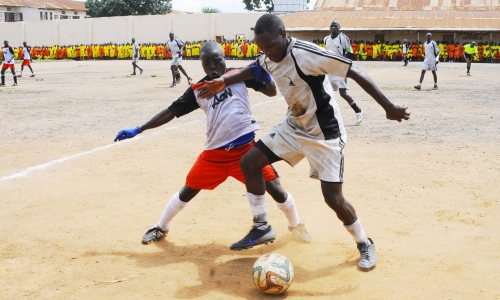
Thieves, rapists and murderers in Uganda’s only maximum security prison play for Manchester United, Arsenal, Chelsea, Barcelona, Juventus, and . . . Hanover 96.
In a gripping podcast recorded in Luzira, a suburb of Kampala, David Goldblatt tells the story of the Upper Prison Soccer Association (UPSA), “the most elaborate prison football league in the world” (listen here).
What emerges form this radio documentary-style piece is a deeply humanistic portrait of a prisoner-run sporting organization that does more, much more than stage occasional kickabouts.
UPSA injects fun, entertainment, and healthy recreation in the otherwise stultifying drudgery of life behind bars. Running it requires hard work, sophisticated organization, and tight discipline. It is a complex, sometimes stressful, affair.
But it works. UPSA helps inmates cope with life on the inside as it strives to transform violent criminals into citizens better prepared for what awaits them after their sentences have been served.
Juve and Me
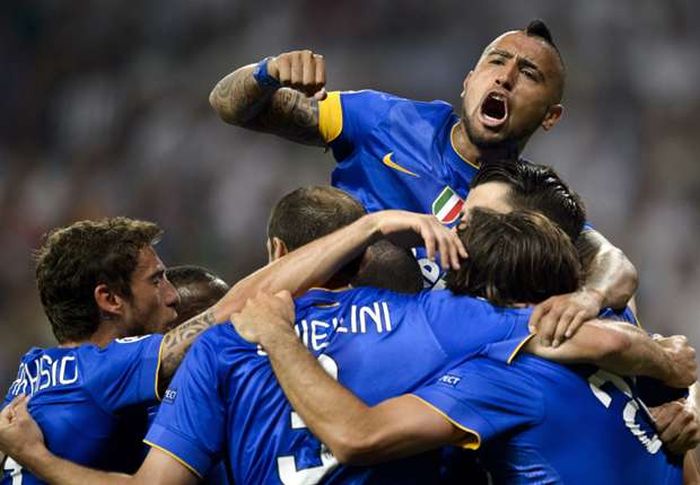
[iOS users click here to listen.]
Juventus, the Old Lady of Italian football, is in the Champions League final for the first time since 2003. In an interview I did a year ago with Austin Long for the Soccer Nomad podcast, I explain how I came to support the bianconeri in the mid-1970s despite being from Rome.
Since I did not live in Turin, I supported Juve from afar and became religiously devoted to Michel Platini and, years later, to Roberto Baggio.
A day after eliminating Real Madrid to earn a date against Barcelona on June 6 in Berlin, it’s funny to hear my rational, realistic assessment of Juve’s prospects for success in Europe alongside my thoroughly irrational dream of winning the European Cup like Milan did in ’94–by thrashing Barca 4-0!
Eduardo Galeano, the Uruguayan conscience of a continent and author of my favorite fútbol book of all time died on Monday, April 13, at the age of 74.
“I’m wandering downtown in the rain searching for words to describe what I’m feeling right now. Something, anything to make sense of the loss,” is all the prose I could muster when I heard the sad news. Fortunately, many other more capable, more productive authors, activists, and scholars posted lovely tributes, although only a few highlighted Galeano’s art of fútbol writing (e.g. click here to read Dave Zirin’s eulogy in The Nation).
As I searched for the appropriate, any!, words to articulate my grief and gratitude, I thought back to when I translated a chunk of the Italian edition of Soccer in Sun and Shadow into English for Joe McGinniss, the American journalist and writer with whom I was corresponding from South Africa as he finished his book The Miracle of Castel di Sangro.
By the time I had returned to Boston to write up my PhD dissertation, the English edition had finally been published (brilliantly translated by Mark Fried) and I took to opening and closing class meetings in my Soccer and Imperialism course (sic!) with a reading from what I called “the Gospel according to Galeano.”
It’s now been four days since our fútbol bard’s passing and I’ve completely failed to find the just-exactly-right words to share with you.
So I returned to the source. Below is my favorite reading from Fútbology’s Sacred Text. Ciao Eduardo!

